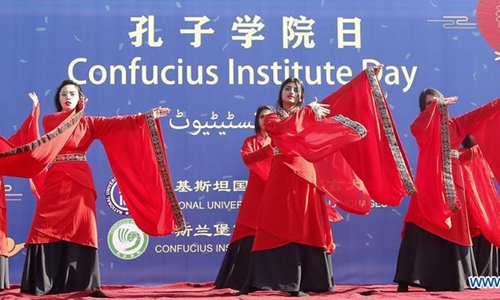HOME >> CHINA
Ex-VUB official regrets Confucius Institute termination
By Li Sikun Source:Global Times Published: 2019/12/19 22:58:40

Pakistani students perform during Confucius Institute Day event at the National University of Modern Languages in Islamabad, capital of Pakistan on Dec. 17, 2019. Photo: Xinhua
Belgium's Vrije Universiteit Brussel (VUB) announced earlier this month that it would end cooperation with the Confucius Institute next year.The Universite libre DE Bruxelles (ULB), a French-speaking private research university in Brussels, Belgium, also announced the suspension of its Confucius Institute project after the existing agreement expires.
Jan Cornelis, a former VUB vice president, said he felt "surprised" by and "deeply regretted" the school's board's decision not to work with the institute in a personal message he sent to the Confucius Institute headquarters in Beijing on Tuesday.
VUB announced that it had decided on December 10 not to extend its contract with the Confucius Institute that expires in June 2020. The university is of the opinion that cooperating with the institute is no longer consistent with its policies and objectives, it said in an official statement.
"The VUB is always open to new collaborations with Chinese universities, scientists and students, on the condition that academic freedom and independence can be guaranteed in mutual trust," the statement said.
"I am still dumbfounded by the decision and the way it was communicated to the stakeholders who collaborated in the making of the CI and its further successful development," Cornelis said in the message.
He said the VUB Confucius Institute is one of the most active ones he saw and he was particularly proud that we could include a research activity on contemporary China in all aspects, besides language education and Chinese culture.
Cornelis said he will always cherish the cooperative relationship with China and hope that trust can be maintained.
Meanwhile, the VUB did not further explain its decision.
Cornelis said in his email that "I did not hear until today an objective motivation that explains the stopping of the Confucius Institute."
The retired vice director told the institute's headquarters that although he does not anymore have the power to decide, "I still have a certain moral authority within the VUB community," and he will use this to obtain more information about the decision.
Despite this, many Belgian media connected the current incident to Belgium's decision to deny the entry to Song Xinning, head of VUB's Confucius Institute a month ago. Local media said Song was barred because of suspected espionage activities.
But many VUB scholars cast doubts on this accusation.
Bruno Coppieters, a professor at the university, published an article on De Standaard, a newspaper in Belgium, that Song has been devoted to pushing forward cooperation between two countries' scholars for many years, and is unlikely to participate in "espionage activities," which is an excuse used by the Western world against China."
"If we let go of such an incident which allows politics to interfere in academics, cooperation between Belgium and China, or even with the whole world, could be influenced," Coppieters said.
"It seems fashionable nowadays in the press to write negative articles about 'all' subjects related to China, but I hope that this is not the reason for stopping the Confucius Institute, because that would go against our VUB guiding principle of free inquiry," Cornelis said in the email.
VUB spokesperson Sicco Wittermans told the Global times on Thursday that Song's ban is one of the considerations of the university's decision, but not the main one.
Wittermans noted that despite the terminated cooperation, the VUB is still seeking other academic cooperation with China, especially with science students.
Chinese Foreign Ministry spokesperson Geng Shang also slammed false reports that accused Song of working as a recruiter for intelligence services in Belgium's business and academic sectors that involve the local Chinese community, saying that was a fabricated allegation driven by ulterior motives.
"We're firmly against such conducts that hamper academic exchanges and education cooperation projects," Geng said.
The Global Times learned that 1,726 students have had classes and 14,490 people have attended cultural activities of the VUB Confucius Institute since it was opened in May 2016. The institute also carried out research projects on China.
Posted in: SOCIETY